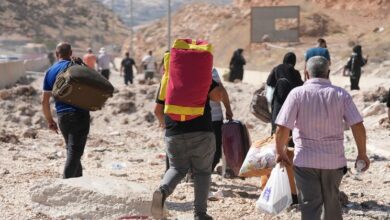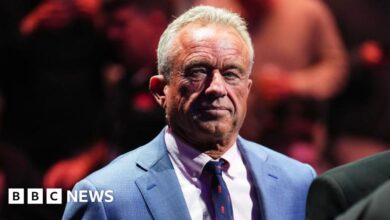Iran launched more than 180 ballistic missiles at Israel
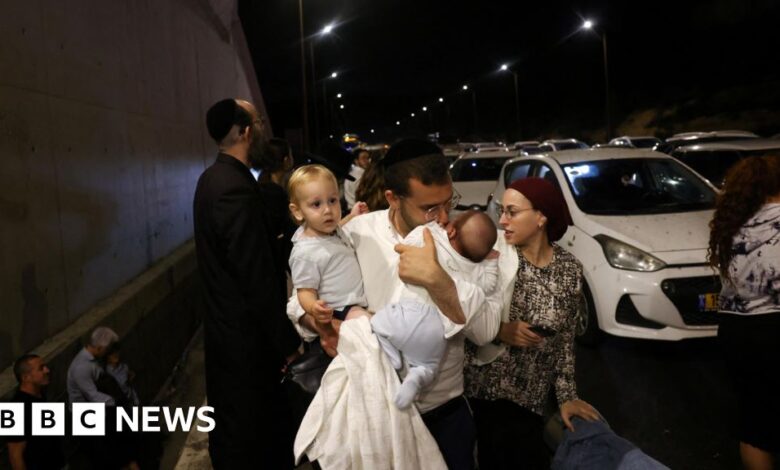
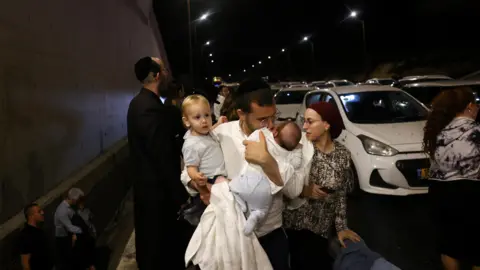 Reuters
ReutersIsrael said Iran launched more than 180 missiles toward the country in a large-scale attack, adding to fears of a full-scale war in the region.
Millions of people rushed to shelters before the explosions lit up the night sky above Tel Aviv and Jerusalem. Medical staff said two people suffered minor injuries from shrapnel.
The Israeli military said most of the missiles were intercepted with US help, but only a few hit their target. They accused Iran of “dangerous escalation” and warned of “consequences.”
Iran’s Revolutionary Guard said the missile hit its target and that it retaliated with the killing of leaders of its allies Hezbollah and Hamas, as well as a top Iranian general.
The US said the missile attack appeared to have been “defeated and ineffective” and that it was consulting with Israel on its response.
The UN Secretary-General condemned what he called “the widening conflict in the Middle East”, adding: “This must stop. We really need a ceasefire.”
The rocket attack took place hours after the Israeli army began invading southern Lebanon to eliminate what the army said were “Hezbollah terrorist targets” in border villages that pose a threat to residents of northern Israel.
Israel has launched an offensive against the Iran-backed Shia Muslim political and military organization after nearly a year of cross-border conflict sparked by the war with Hamas in Gaza. Hezbollah missile, drone and rocket attacks.
Air raid sirens sounded across Israel at around 19:30 local time (16:30 GMT) on Tuesday, as the Israel Defense Forces (IDF) warned that missiles had been launched from Iran.
Within minutes in Jerusalem, loud explosions were heard in Jerusalem as missiles flew overhead and were intercepted by Israeli air defense systems.
Videos shared on social media showed flashes of light as the missiles flew over Israel and plumes of smoke as they were intercepted or exploded on impact.
Just over an hour later, the IDF announced that people were allowed to leave their protected space because they “did not identify any further aerial threats from Iran.”
Later, IDF spokesman Rear Admiral Daniel Hagari said in a statement that “there were a small number of attacks in central Israel and other attacks in southern Israel”.
“The majority of incoming missiles were intercepted by Israel and the US-led defense coalition.”
He added: “Iran’s attack is a serious and dangerous escalation. There will be consequences.
“Our defense and attack are at the highest level of readiness. Our action plan is ready.
“We will respond wherever, whenever and however we choose, as directed by the Israeli government.”
US National Security Advisor Jake Sullivan told reporters at the White House that he was “not aware of any damage to aircraft or strategic military assets in Israel”.
“In summary, based on what we know at this time, this attack appears to have been defeated and ineffective,” he added.
He also condemned the attack as “a significant escalation” and warned: “We have made it clear that there will be consequences, serious consequences, to this attack and we will cooperate with Israel to resolve that issue.”
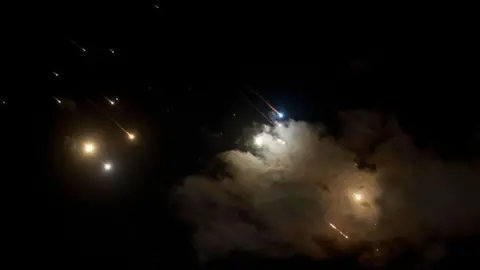 AFP
AFPIran’s Islamic Revolutionary Guard Corps (IRGC) issued a statement saying it had launched multiple ballistic missiles into “the heart of the occupied territories” and targeted “security and military centers”. sensitivity” unspecified.
The attack was retaliation for the “violation of Iran’s sovereignty and the martyrdom” of Hamas political leader Ismail Haniyeh, who was killed in an explosion in Tehran in July that Iranian officials blamed Blame Israel, but Israeli officials did not declare it. The statement described the missile firing as “in accordance with the nation’s legitimate right to self-defense.”
They also said the attack was in response to an Israeli airstrike in the southern suburbs of Beirut on Friday that killed Hezbollah leader Hassan Nasrallah and Brigadier General Abbas Nilforoushan, commander of the IRGC’s overseas Quds force operations. , died.
The IRGC warned Israel that it would “face further fatal blows” if it responded to the attack.
Later, Iranian state media claimed that missiles had hit Nevatim, Hazterim and Tel Nof air bases, as well as Israeli tanks in Netzarim – a reference to Israel’s military corridor in central Gaza – and gas facilities in the southern Israeli city of Ashkelon.
The attack took place about an hour after a senior White House official told reporters that the US had signs that Iran was preparing to launch missiles at Iran.
Prime Minister Benjamin Netanyahu later told Israelis in a video statement: “We are waging a campaign against Iran’s axis of evil.
“Together, we will stand strong in the challenging days ahead. Together we will stand strong. Together we will fight and together we will win.”
Meanwhile, the US military’s Central Command announced that three additional squadrons of F-16, F-15E fighter aircraft and A-10 attack aircraft will arrive in the Middle East and one squadron has arrive.
Over the weekend, the Pentagon also ordered the USS Abraham Lincoln aircraft carrier strike group to stay in the area to “prevent aggressive behavior”.
In April, Iran launched more than 300 drones and missiles at Israel in retaliation for a deadly attack on the Iranian consulate in Syria that killed several top commanders.
Almost all of them were shot down by Israel, the US, their Western allies and their Arab partners, and an air base in southern Israel suffered only minor damage when attacked.
Israel responded by launching missiles to attack Iran’s air base and the West called for restraint.
On Saturday, Iran’s Supreme Leader Ayatollah Ali Khamenei promised that the death of his close ally, Hassan Nasrallah, would “not be avenged.”
He did not give details but said: “The fate of this area will be decided by the resistance forces, with Hezbollah at the forefront.”
Iran has built a network of allied armed groups across the Middle East, all of which oppose the United States and Israel and sometimes call themselves the “Axis of Resistance.” In addition to Hezbollah, they include Hamas in the Palestinian territories, the Houthis in Yemen and some Shia militias in Iraq and Syria.


